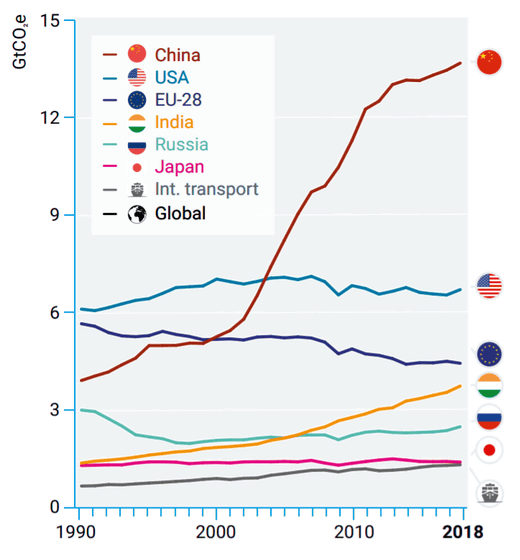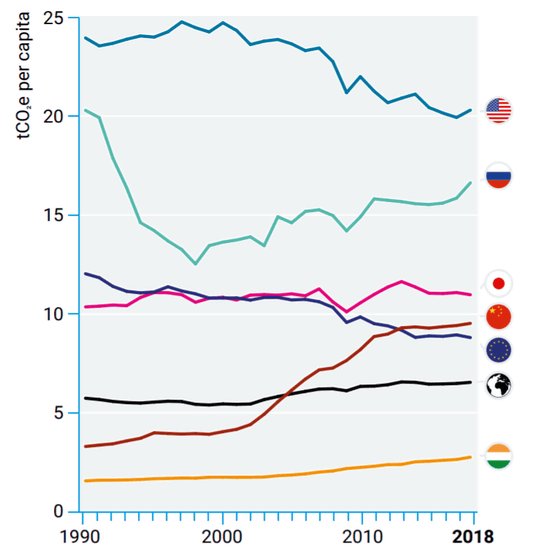“The greenhouse gas reduction is behind schedule,” the UN agency reports

By
On November 26, 2019, the United Nations Environment Program (UNEP) released a report `` Emissions Gap Report 2019 '' that examined how much difference there is between the greenhouse gas reduction plan and the actual greenhouse gas reduction degree . This report reports that despite the agreements of each country to prevent global warming, there is no actual reduction of greenhouse gases.
Emissions Gap Report 2019 | UNEP-UN Environment Program
https://www.unenvironment.org/resources/emissions-gap-report-2019
The Emissions Gap Report 2019: A UN Environment Synthesis Report-NewClimate Institute
https://newclimate.org/2019/11/26/emissions-gap-report-2019/
UN report card: Carbon-emissions cuts are way behind schedule | Ars Technica
https://arstechnica.com/science/2019/11/un-report-card-carbon-emissions-cuts-are-way-behind-schedule/
Below is a graph of greenhouse gas emissions by country published in the report. The vertical axis is the amount of greenhouse gas emissions, and the unit called “ GtCO2 ” is used, which is a total of carbon dioxide (CO2) converted into carbon dioxide (CO2) based on the “degree of impact on global warming”. The The horizontal axis is the number of years since 1990. China emits greenhouse gases more than twice as much as the second largest US.

On the other hand, the following graph shows the amount of greenhouse gas emissions per person. You can see that the US, Russia, and Japan have more greenhouse gas emissions than the population.

When comparing the
This report mainly deals with the Cancun Conference, where each country announced its commitment to greenhouse gas emissions up to 2020, and the Paris Agreement on greenhouse gas emissions up to 2030, within the Framework Convention on Climate Change. The Regarding the 2020 commitment, Canada, Indonesia, Mexico, South Korea, South Africa, and the United States of the G20 countries are not expected to meet the reduction target. Regarding the promise of 2030, it is said that EU countries including China and the UK, India, Mexico, Russia and Turkey are on track to achieve the reduction target. On the other hand, Japan, Korea, the United States, Australia, Brazil, Canada, South Africa, and the United States need more efforts.
Even if countries participating in the Paris Agreement achieve their respective reduction targets, by 2030, approximately 54 billion tons of greenhouse gases will be emitted, equivalent to a 3 ° C increase in global temperature. If the rise in temperature is to be kept at 2 ° C, the amount of greenhouse gas that can be emitted is about 39 billion tons. At 1.5 ℃, only about 22 billion tons can be discharged. The Intergovernmental Panel on Climate Change (IPCC) suggests that “global warming should be limited to 1.5 degrees in order to stop the rise in average temperatures resulting in rapid and irreversible changes in the climate”.
The current status of global warming and its impact are discussed in the following articles.
There is a possibility that the global environment has come to `` where it can no longer return ''-GIGAZINE
https://gigazine.net/news/20191128-climate-tipping-points/

by
2020 is considered the turning point of the Paris Agreement. The Paris Agreement stipulates that a large-scale meeting will be held every five years to improve and review the commitment, and 2020 will be the first meeting every five years. In addition, 2020 will be the year when the US officially leaves the Paris Agreement.
US Trump administration “Paris Agreement” officially notified of the issue of presidential election | NHK News
https://www3.nhk.or.jp/news/html/20191105/k10012164241000.html

The report recommends that countries stop using fossil fuels and shift to renewable energy so that they can meet their reduction targets. One example is the use of electricity for transportation.
Related Posts:
in Science, Posted by darkhorse_log







